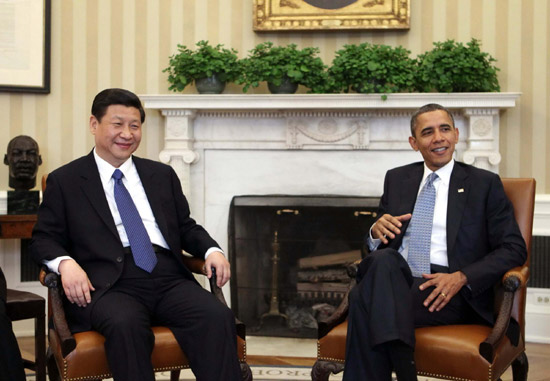Xi defends China's position on contentious issues
 0 Comment(s)
0 Comment(s) Print
Print E-mail Xinhua, February 15, 2012
E-mail Xinhua, February 15, 2012
Chinese Vice President Xi Jinping engaged in candid and straight-forward talks with top U.S. officials on a variety of contentious issues on Tuesday.
 |
|
China's Vice President Xi Jinping (L) meets with U.S. President Barack Obama at the White House in Washington, February 14, 2012. [Xinhua] |
Warning against U.S. protectionism
Facing a tough bid for reelection in November at a time when America's unemployment rate remained stubbornly high, U.S. President Barack Obama used his meeting with Xi at the White House to press charges against what Washington sees as "unfair" trade practices of China.
Xi warned Washington against protectionist measures in his behind-the-scenes talks with Obama, Xinhua learned.
Trade friction between China and America should be resolved through dialogue, not protectionism, on the principle of consultation on an equal basis and mutual benefit, the Chinese vice president told Obama.
Speaking to reporters before their close-door meeting, Obama, while reiterating Washington's policy of welcoming "China's peaceful rise," urged China to play by internationally-accepted rules on trade and economic issues.
"We want to work with China to make sure that everybody is working the same rules of the road when it comes to the world economic system, and that includes ensuring that there is a balanced trade flow between not only the United States and China, but around the world," Obama said.
Although bilateral trade was still "unbalanced" in favor of China in 2011, U.S. exports to China outgrew its imports, highlighting the Asian powerhouse's crucial role as an increasingly important market for American goods and services.
According to Chinese figures, U.S. exports to China reached 122.2 billion dollars in 2011, up some 20 percent from the previous year, while American imports from China jumped to 324.5 billion dollars, a 15-percent increase.
Prior to meeting with Obama, Xi held talks with U.S. Vice President Joe Biden, during which he highlighted the importance of trade and economic ties in the overall bilateral relationship.
China-U.S. economic and trade ties serve as "ballast" and a "propeller" for overall bilateral relations, Xi said.
He expressed the hope that the two countries would improve their coordination of macroeconomic policies, deepen cooperation in handling the international financial and European debt crises, and advance cooperation programs on trade and investment.
The two sides, he added, should also preserve the basic pattern of mutual benefit and win-win results in their trade and economic relations.
U.S. politicians have long resorted to blaming China for job losses and other domestic economic hardships.
The Obama administration has imposed punitive tariffs on numerous Chinese imports such as tires and solar panels in recent years, moves that Chinese manufacturers say are unwise policies aimed at protecting uncompetitive U.S. industries and will hurt not only Chinese exporters but American consumers too.
International business experts have long argued that the U.S. trade deficit with China, largely a structural problem, has as much to do with Washington as with Beijing.
Simply put, as the U.S. economy shifts from manufacturing to services, it has to import much of what the nation consumes day to day from other countries such as China.
It is also worth noting that a large number of the goods America imports from China are actually manufactured by U.S. companies, that have shifted their production to China for its relatively low labor costs and lucrative investment incentives.
Defending China's human rights record
After his meeting with Obama, Xi was received at a luncheon at the State Department hosted by Biden and Secretary of State Hillary Clinton.
The exchange there touched on the politically sensitive issue of China's human rights record.
Xi, while acknowledging the enormous challenges faced by the Chinese government to improve human rights in the nation of over 1.3 billion people, emphasized China's efforts to address "people's aspirations and demands."
"Given China's huge population, considerable regional diversity and uneven development, we are still faced with many challenges improving people's livelihood and advancing human rights," Xi said.
"The Chinese government will always put peoples' interests first and take seriously people's aspirations and demands," he added.
Besides defending China's human rights record, Xi also extended an invitation for dialogue between China and America to sort out their differences on the thorny issue.
China is ready to conduct candid and constructive dialogue and exchanges on human rights with the United States and other countries on the basis of equality and mutual respect, Xi told his U.S. hosts.
China, as a large developing country, does need the expertise that America can offer when it comes to advancing human rights and achieving the rule of law.
However, such a win-win scenario of human rights interactions between China and America can only be achieved through dialogue, and harsh rhetoric from Washington against Beijing, which has consistently proved ineffective, will only poison the atmosphere of the complex bilateral relationship.





